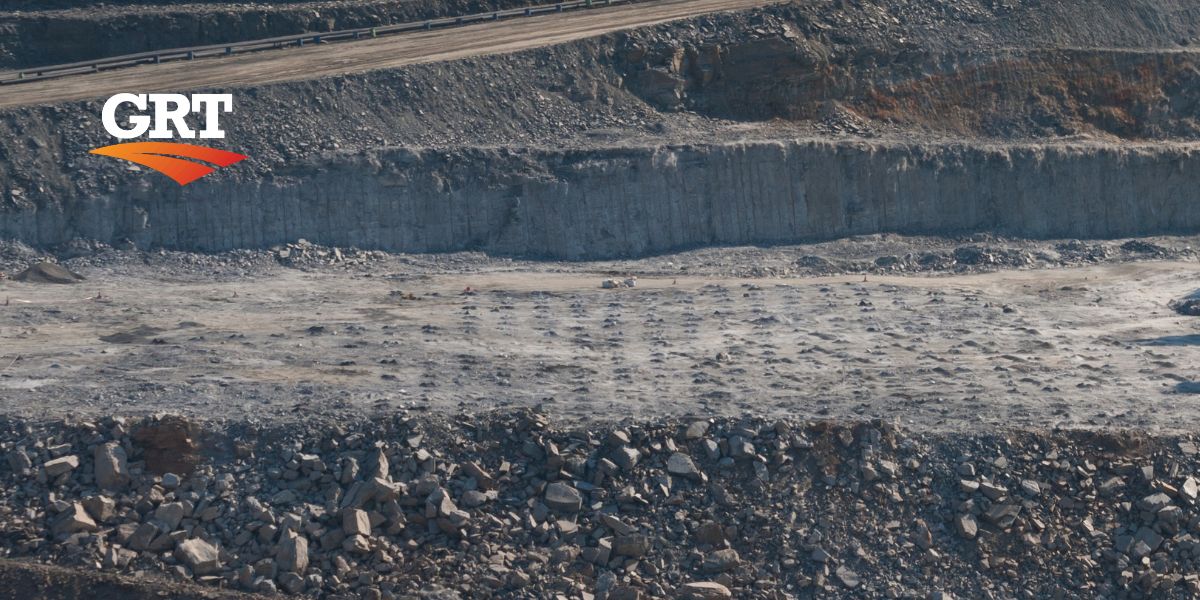Soil Stabilisation Series – Article 4
This article focuses on the products that Global Road Technology currently has an offer for soil stabilisation. Each product will be discussed in reference to its mechanics, its composition and its practical applications. Each product has been specifically designed for overcoming specific issues within the industry. However, the versatility of these products can allow them to be used for a range of other purposes outside the scope for traditional agents. In the industry today, soil stabilisation is fundamental in the areas of construction and civil engineering. The advancements in this technology will see the rise of more effective civil solutions.
PRODUCT 1 – GRT 9000 – POLYMER SOIL STABILISATION
Poor quality pavements can have serious consequences to the owners or managers of the roads financially and make them liable, as the effects of dust, potholes, rutting and corrugation can seriously harm people in many circumstances. This is where the GRT9000 comes in. This engineering product has been specifically designed according to the ISO 9001 standards, with its primary use of increasing the life of inadequate, unsealed pavements that have been weathered away by changes in temperature and consistent exposure to pressure from heavy traffic. GRT9000 is a polymer stabilising agent and it utilised in shallow applications. It ideally works in arid climates where the temperature and dryness allow it to dry at greater depths, to maximise stabilisation at the surface.
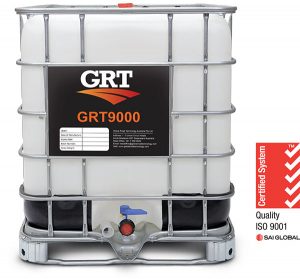 It works cooperatively with GRT’s Slurry Seal. Both GRT Slurry Seal and GRT 9000 have both been engineered with the same polymers. Slurry Seal is a mixture of the GRT9000 polymer, water and coarse sand. What makes them different is their application. For example, a road base of Type 2.1 may be treated with GRT9000 at a rate of 1.5% w/w in the aim of providing a strong pavement with a compressive strength of up to 10Mpa. However, the Slurry Seal is applied on top of the GRT9000, which acts as a protective layer. What makes these products desirable is that both of these products can be applied with basic equipment such as water trucks and rollers.
It works cooperatively with GRT’s Slurry Seal. Both GRT Slurry Seal and GRT 9000 have both been engineered with the same polymers. Slurry Seal is a mixture of the GRT9000 polymer, water and coarse sand. What makes them different is their application. For example, a road base of Type 2.1 may be treated with GRT9000 at a rate of 1.5% w/w in the aim of providing a strong pavement with a compressive strength of up to 10Mpa. However, the Slurry Seal is applied on top of the GRT9000, which acts as a protective layer. What makes these products desirable is that both of these products can be applied with basic equipment such as water trucks and rollers.
Are environmental regulations, health and safety concerns or potential profit loss a concern right now?
The versatility of this product allows it to be applied on in situ or on imported materials. In both cases, it results in a hard, semi-flexible, and impermeable surface material. The GRT 9000 focuses on acting as a physical, protective layer against surface degradation by increasing the bearing load and tensile strength of the pavement, allowing to endure heavier traffics for a longer period of time. In addition to this, compared to a laid pavement of asphalt or concrete, it provides a cost efficiency of approximately 50%-70%. What makes this product unique, is the range of properties it has whilst being coupled with being versatile. Some properties of this product are non-flammable, water-resistant, biodegradable, non-leeching, odourless, non-dissipating, UV resistant and non-corrosive. Meaning that in no way, shape or form, does this negatively affect the public, the business, nor the environment, removing any potential risks and hazards to any personnel, areas or machinery.
PRODUCT 2 – GRT PCM – POLYMER CEMENT MODIFIER
After a number of successful products offered by GRT in the soil engineering area, the company adjusted its goal to find an even more versatile product for their range of alternative technology. After extensive research, the GRT Polymer Cement Modifier (PCM) was founded. This product combined traditional cementitious stabilising agents, which overcame the shortcomings, and improved the properties of using cementitious materials alone. This product undertook numerous testing to ensure validity and practicality in real-world situations. The PCM was consistently observed at reducing shrinkage-cracking and increasing the compressive strength, which resulted in a cost-effective reduction in water use and demand.
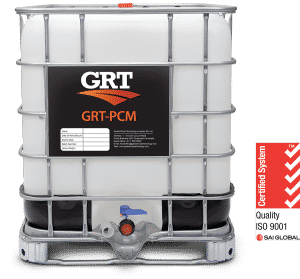 Conventional cement has a grouped structure of a number of chemicals from silicate hydrates to calcium hydroxide, which is bound together by intermolecular forces. However, chemically, intermolecular forces are known to be weak and will produce microfractures in the concrete when under stress, this leads to poor tensile strength and toughness in real-world scenarios. However, if GRT’s PCM is in the mix, the polymer technology supports the current microfractures within the cement, re-establishing a stronger structure, which in turn prevents further crack propagation. As a result, a chemical reaction occurs that results in a hydrate bond to form, which are chemically known to be intermolecularly robust. The addition of a reinforced molecular structure allows for resistance to chemical penetration, waterproofing, freeze-thaw durability, rapid curing of ambient temperatures and improved vibration dampening.
Conventional cement has a grouped structure of a number of chemicals from silicate hydrates to calcium hydroxide, which is bound together by intermolecular forces. However, chemically, intermolecular forces are known to be weak and will produce microfractures in the concrete when under stress, this leads to poor tensile strength and toughness in real-world scenarios. However, if GRT’s PCM is in the mix, the polymer technology supports the current microfractures within the cement, re-establishing a stronger structure, which in turn prevents further crack propagation. As a result, a chemical reaction occurs that results in a hydrate bond to form, which are chemically known to be intermolecularly robust. The addition of a reinforced molecular structure allows for resistance to chemical penetration, waterproofing, freeze-thaw durability, rapid curing of ambient temperatures and improved vibration dampening.
PRODUCT 3 – GRT 7000 – POLYMER SEAL
The GRT 7000 product has been manufactured according to the ISO9001 standards and has been reviewed and approved by leading independent testing institutions world-wide. The GRT-7000 is an opaque drying, environmentally friendly liquid polymer. It is primarily utilised as a polymer seal product and stabilisation agent, it has been referred to also as a surface stabiliser. The mechanics of the GRT 7000 are as follows: once the product is initially applied, the polymer actively works by accumulating dust particles together and inhibiting them from becoming suspended. Furthermore, the chemical composition of the product allows the polymers to physically bond with soil or pavement particles, which formulates a structure that has an increase in compressive strength, tensile resilience and water impermeability. The GRT 7000 is required to be re-applied every 12-16 weeks depending on the load.
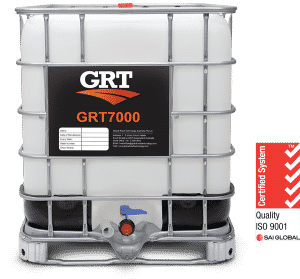 Practically, these properties prevent corrugation and potholing from occurring, as well as providing skid and rolling resistance. This product was specifically designed for new construction (such as subgrade, subbase and base improver), pavement recycling (in-situ) and/or sealing and stabilising. In terms of sealing and stabilisation, there is a wide range of practical applications, such as haul roads, sidetracks, car parks, construction/ military camps, container hardstands, railroad yards and temporary landing areas.
Practically, these properties prevent corrugation and potholing from occurring, as well as providing skid and rolling resistance. This product was specifically designed for new construction (such as subgrade, subbase and base improver), pavement recycling (in-situ) and/or sealing and stabilising. In terms of sealing and stabilisation, there is a wide range of practical applications, such as haul roads, sidetracks, car parks, construction/ military camps, container hardstands, railroad yards and temporary landing areas.
Cost savings accumulate to approximately 30%-40% due to its replacement of daily watering, grading, reduced physical damages from wear and tear on vehicles, improved haul time and the elimination of downtime during and after weather events. Thus making it an effective engineering solution not only practically, but also financially.
Global Road Technology’s Focus
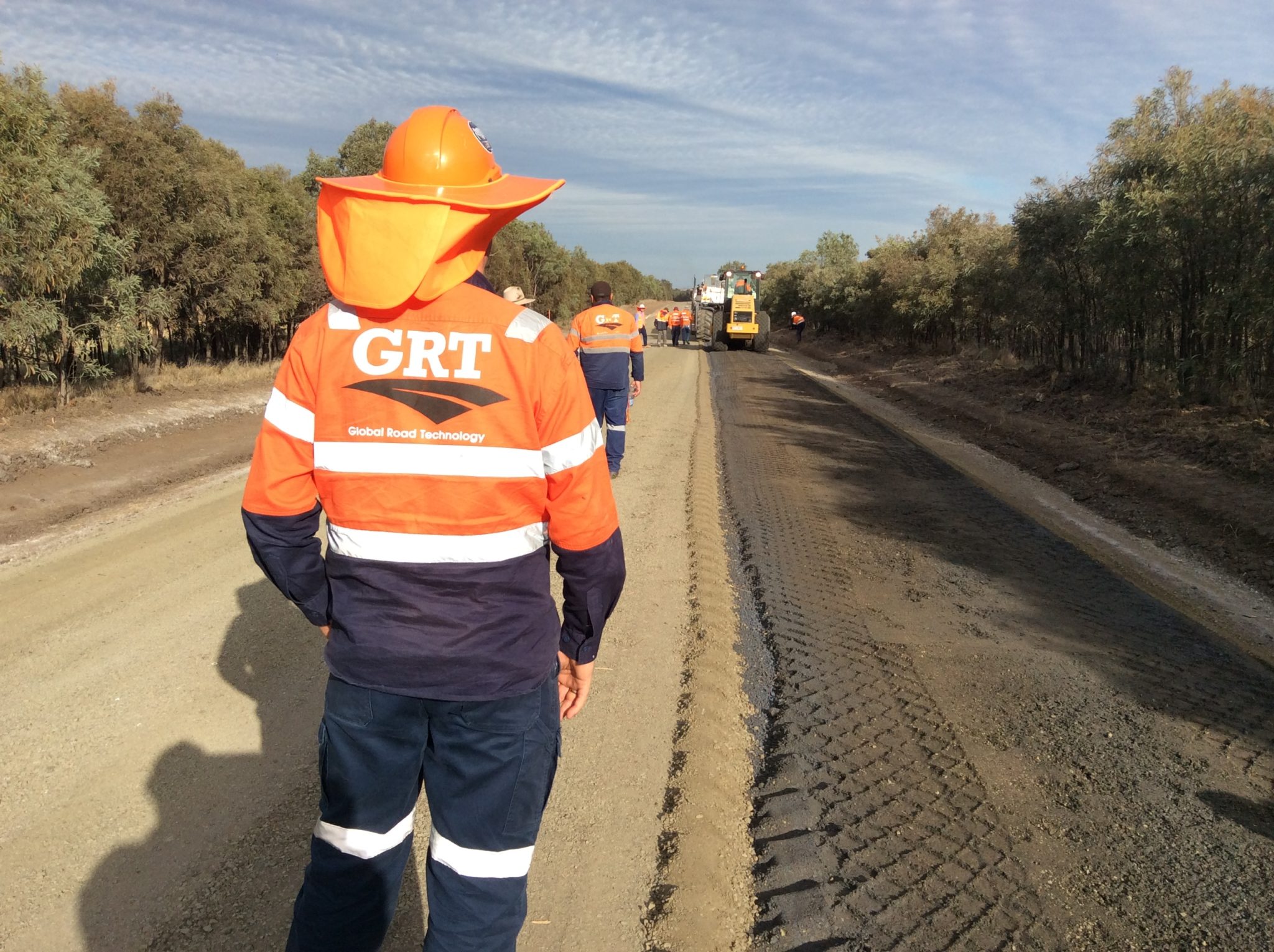
Global Road Technology does not only focus on achieving their goal but surpassing it by ensuring their product is as versatile as possible. The GRT-PCM, in particular, can be utilised for not only rehabilitation and strengthening of existing granular pavements, but also for recycling of existing cement stabilised pavements, construction of pavement, and working platforms. These properties are most often utilised on soft ground conditions where stiff bridging layers are required to compact overlying materials, pavements with temporary trafficking during various times through times of construction, modification and improvement of non-organic subgrade conditions and can be further used in areas that are susceptible to high rainfall and inundation due to their chemical properties. These innovative solutions give a glimpse into the future of safety measures and risk management that will one day be considered normal. GRT is not only focused on a single goal but tackling the major issues in the industry today that are putting our workers at risk. Putting mitigation a priority, and protecting Australian businesses, business relationships and Australia’s resource industry workers alike. GRT play a critical role as Australia begins to slowly adapt to new technology and safety measures that will shape the roads, resources, and rural industries for the next 50 years.
Your feedback is important to us. If you enjoyed reading this Global Road Technology industry update and found it informative, please let us know by leaving a REVIEW.
Troy Adams
Troy Adams is the Managing Director of Global Road Technology (GRT) Specialising in Engineered Solutions for Dust Suppression, Erosion Control, Soil Stabilisation and Water Management. A pioneering, socially conscious Australian entrepreneur, Troy Adams is passionate about health and safety and providing innovative solutions that are cost-effective to the mining industry, governments and infrastructure sectors. Troy is also a tech investor, director of companies like Crossware, Boost, Hakkasan, Novikov and more.

